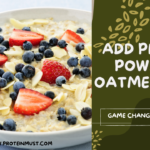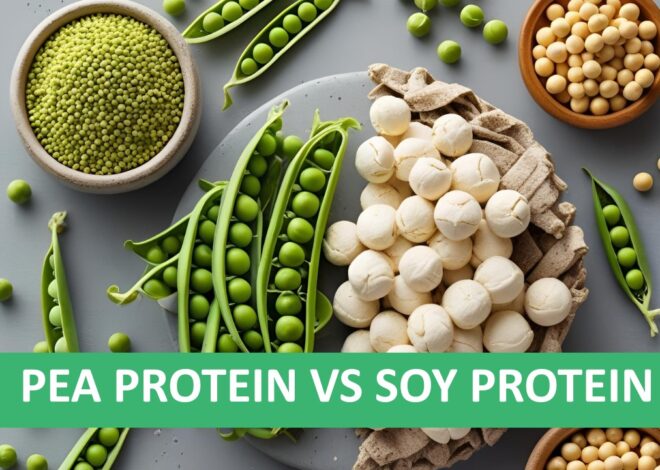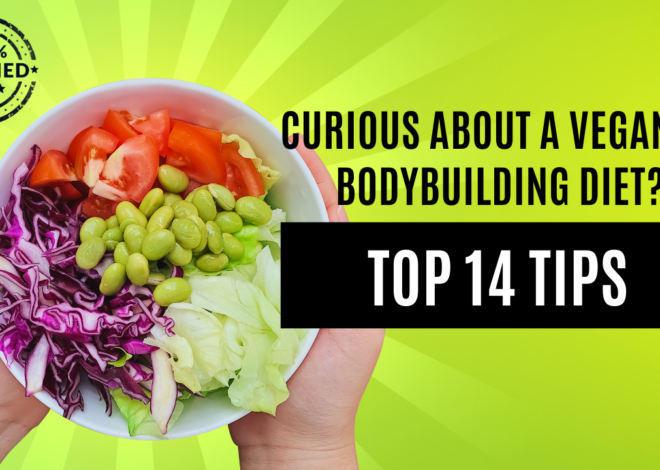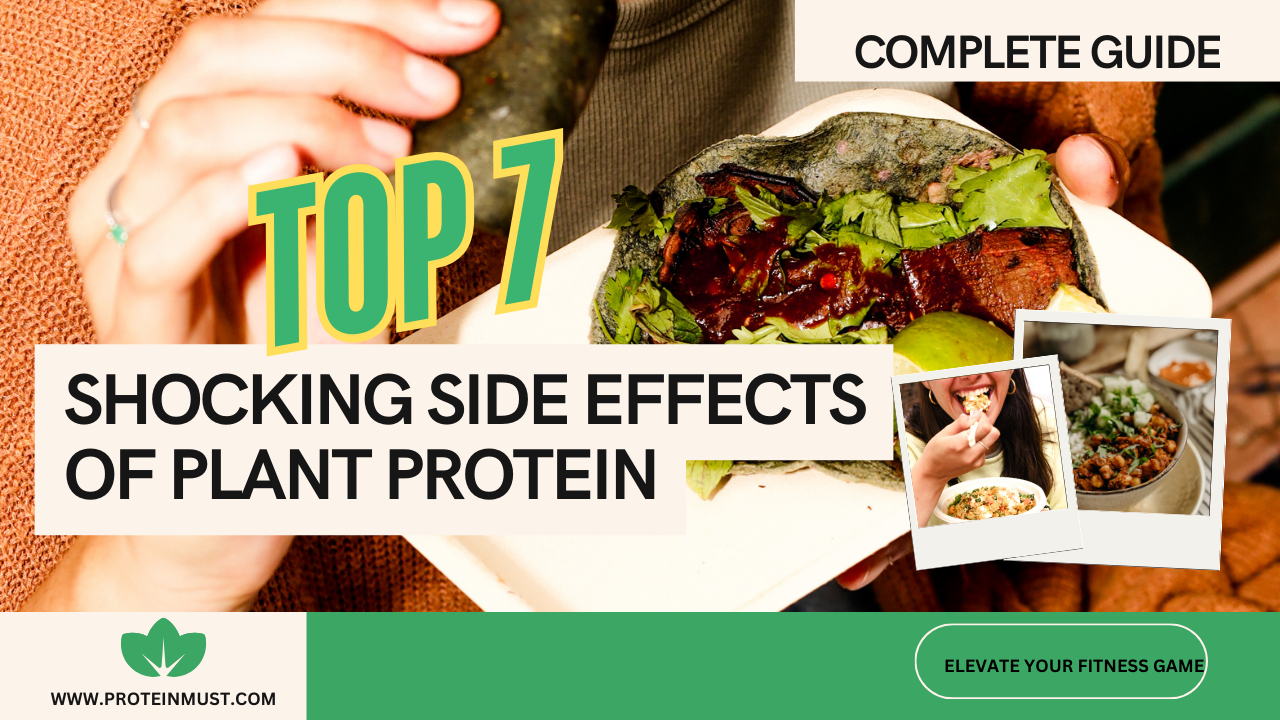
Top 7 Shocking Side Effects of Plant-Based Protein Powder
Many people turn to plant-based options for their protein boost, believing they are a healthier choice. But the side effects of plant-based protein powder can be surprising. Some protein powders contain anti-nutrients that reduce nutrient absorption, leading to nutrient deficiencies over time. Without a variety of protein sources, your body may not get all the essential amino acids needed for muscle growth and recovery. Also read Dangers of Artificial Flavors.
A high intake of soy, peas, or hemp may cause digestive issues like bloating or gas, especially in those with sensitivities. It’s crucial to balance these with other nutrient-dense foods. Many powders are high in additives, which can lead to unexpected health risks. When choosing a plant-based supplement, consider quality over quantity. Knowing what’s in your protein powders is key to avoiding unwanted side effects.
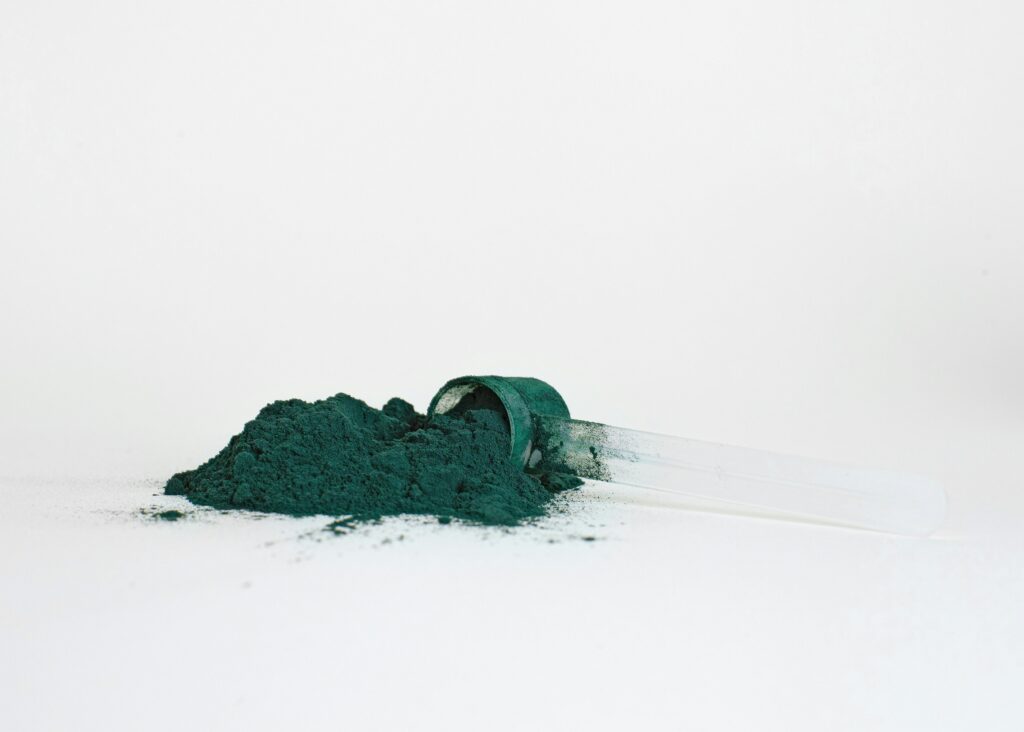
Hidden Dangers of Plant-Based Protein Powder
Plant protein powder is a supplement made by extracting protein from rich sources like yellow peas. It contains pea protein, a high-quality option with a great source of iron. Many use it to aid muscle growth, support weight loss, and improve heart health. Despite its benefits, some may experience side effects of plant-based protein powder, such as digestive discomfort. It can also be one of the Side Effects of Plant-Based Protein. These powders are alternatives for vegans and those with lactose intolerance. Being vegan-friendly and lactose-free, they offer benefits like being low in fat and cholesterol, while being high in fiber and antioxidants Since they’re sustainable and environmentally-friendly, they’re often preferred over animal-based options.
Plant-Based Protein Powder Side Effects
Following are some potential side effects of plant based protein powder
- Incomplete Amino Acid Profile
- Reduced Nutrient Absorptions
- Digestive Discomfort
- Risk of Nutrient Deficiencies
- Lower Protein Bioavailability
- Potential Allergies or Sensitivities
- Excessive Carbohydrate Intake
- Need for Food Combination
- Oxalate and Phytate Content Taste and Texture Differences
Understanding the core of plant based protein powder
What is Plant Protein?
Plant protein is a type of protein derived from high-protein vegan food sources like legumes, nuts, seeds, and grains. Unlike animal-based protein, which is often high in saturated fat and cholesterol, plant-based options are rich in essential nutrients and fiber. Many vegans and vegetarians rely on them to avoid animal products while still getting an excellent source of nutrition.
The Power of Plant-Based Proteins
For plant-forward eaters, discovering plant-based protein is like uncovering a treasure chest in your backyard. Though there are potential side effects of plant-based protein still its Sourced from Mother Nature’s pantry, ingredients like peas, soy, and hemp serve as more than just muscle builders. They provide a well-rounded plate, packed with good vibes for your body. But while they offer benefits, the side effects of plant-based protein powder can’t be ignored.
Pea Protein
Pea protein is a muscle-building ally, often found in protein powders for its ability to support muscle growth. With a high rate of absorption, it’s similar to whey protein but remains incomplete. To be fully effective, it must be paired with other plant-based proteins. Over-reliance on pea-based protein may lead to deficiencies, so balance is key.

Hemp Protein
Hemp protein is the laid-back champion, delivering a mix of high-quality vegan protein alongside healthy fats and fiber. It keeps your diet in harmony, but some experience digestive discomfort due to its fiber content. Choosing a balanced approach ensures you get the benefits without unwanted side effects.

Soy Protein
Soy protein is a dynamic contributor, valued for its high protein content and versatility. It’s a popular choice for those aiming to enrich their diet with plant-based power. As one of the most effective plant-based proteins, it is digested and absorbed at a moderate rate. Additionally, it’s an excellent source of glutamine, which the body naturally produces but requires in greater amounts during workouts. This amino acid enhances tissue repair and limits damage to muscles, making it a key component in muscle recovery. However, excessive consumption of soy protein may lead to hormonal imbalances in some individuals.
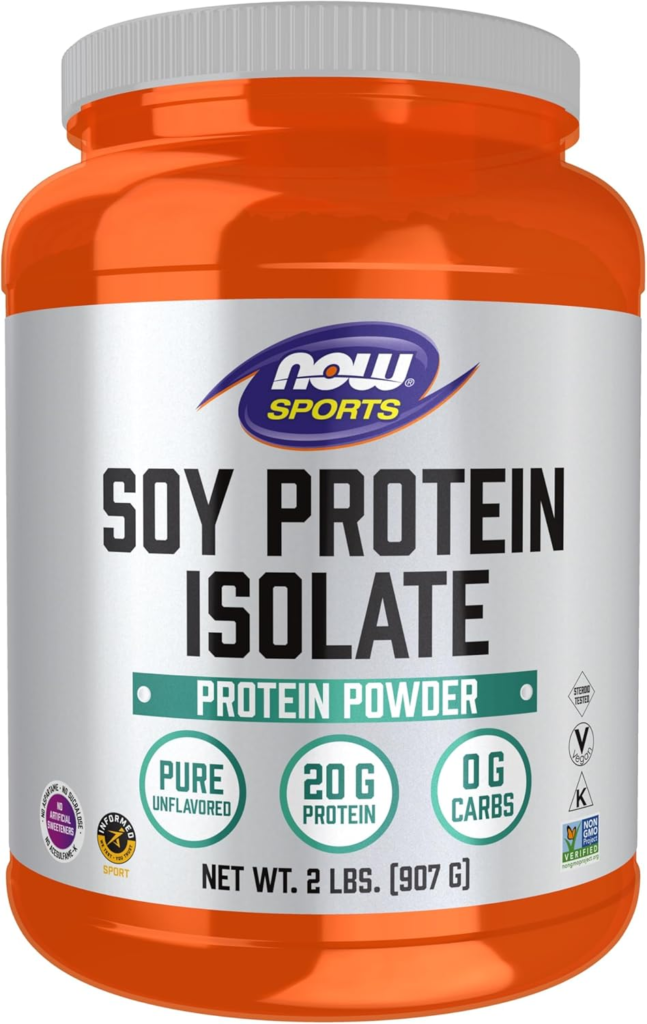
Rice Protein – A Nutrient-Rich Option
Rice protein, especially from brown rice, offers substantial quantities of vitamin B and fiber. It is naturally gluten-free and lactose-free, making it ideal for those with sensitivities. To gain maximum benefits, it should be paired with another plant-based protein source, as it lacks some essential amino acids. While a great option, some side effects of plant-based protein powder include mild digestive discomfort if not balanced properly.
Sources of Plant Protein
There are various sources of plant protein that can easily be added to your diet.
- Legumes like lentils
- Chickpeas
- Black beans
- Soya beans provide a solid foundation.
- Nuts and seeds such as almonds,
- Chia seeds
- Hemp seeds
- Pumpkin seeds
- Grains like brown rice, oats, and quinoa
- Vegetables options like spinach, broccoli, and brussels sprouts
- Tofu and whole grain
Adding these proteins to your daily routine helps meet your protein needs while offering more than just muscle benefits. It’s about adding a splash of health benefits to your diet, making every meal or shake work towards better health. However, it’s wise to be aware of potential side effects of plant-based protein powder, especially when consuming them in excess.
Benefits & Side effects of Plant Based Protein Powder:
Before making plant based a choice you should be familiar with benefits and side effects of plant-based Protein to make best decision.
Plant Protein Powder Benefits
Apart from potential side effects of plant-based Protein there are number of benefits involved in plant based protein. Following are some key benefits:
Ease of Digestion:
There are numerous benefits to plant protein powder, with ease of digestion being one of the most significant. Plant-based protein is often easier to digest than animal-based protein due to its high fiber content, which helps promote healthy digestion and supports the digestive system. Many plant-based sources, like beans, lentils, and quinoa, are also rich in vitamins and minerals that enhance digestion.
Heart Health
A plant-based diet offers significant heart health benefits, as it tends to be lower in saturated fats compared to animal-based protein sources. Studies suggest that diets rich in plant-based protein have been linked to a lower risk of heart disease and stroke. Nuts, seeds, and legumes are excellent plant-based protein sources that can support cardiovascular health due to their richness in minerals like magnesium and potassium, both of which promote healthy blood pressure levels. This is one of the core benefit to make us ignore side effects of plant-based Protein.

Easier to Absorb
One of the significant advantages of plant-based protein powders is that they are often easier to absorb. These proteins are typically derived from vegetable sources and can be sprouted to enhance their absorbable protein content. By sprouting nuts, beans, and seeds, the amount of protein released becomes higher and more accessible compared to animal-based sources. When paired with amino acids, this protein improves the digestive process in your gut and helps the body use it for vital bodily functions.
Makes You Feel Fuller
Plant-based protein sources, such as legumes and beans, have a tightly compacted structure, which means you get a greater quantity of protein from the same amount of food. By adding whole foods or protein powder to your meals, you can feel fuller for longer periods and reduce your appetite. These foods also regulate hunger hormones like ghrelin and YY peptides, signaling your brain to avoid unhealthy cravings and junk foods, which can help with weight loss goals and metabolic function.
Fulfills Nutritional Requirements
A plant-based diet rich in diverse sources of plant protein can fulfill your daily nutritional needs. The fiber, vitamins, and minerals found in plant-based proteins help reduce the risk of chronic diseases like heart disease and diabetes. Compared to animal protein, plant protein offers a greater amount of essential nutrients, including magnesium, potassium, and dietary fibers. These nutrients are especially beneficial for those who struggle not only with a lack of protein but also with inadequate nutrition.
Aids Muscle Health
A proper combination of amino acids and proteins is essential for maintaining muscle health. This is particularly beneficial for athletes who may experience small muscle tissue tears during training, as these nutrients work together to rebuild damaged tissues. The quick digestion of amino acids in plant protein makes it an excellent option for boosting muscle mass. Additionally, plant protein supports the regulation of muscle expansion and muscle contraction, which, when combined with appropriate workouts, can assist in sculpting the body and improving muscle tone.

Aids Cognitive Functioning
Plant-based proteins are often derived from medicinal herbs and natural whole foods, providing not only protein but also vital nutrients like B vitamins, phosphorus, and manganese, which are key for supporting cognitive functioning. These nutrients help increase oxygen levels in the brain, improving the transmission of bodily fluids and promoting better blood circulation throughout the body. As a result, there is a decrease in triglyceride levels, removal of harmful cholesterol, and reduced oxidative stress on the brain.
Ideal Supplements
For vegetarians and vegans, plant-based protein powders are an ideal choice, especially for those who might not be getting enough protein from their regular whole foods.
Improved Heart Health and Minerals
Plant-based protein powders have been linked to a reduction in cholesterol levels and markers of heart diseases, as shown by various studies. Many of these powders contain micronutrients, including antioxidants, vitamins, fiber, and minerals, which are essential for overall health.
Side Effects of Plant-Based Protein Powder
Ever wonder why a protein powder that’s a hug in a mug for your friend might not sit right with you? It’s because we all have unique ways of handling different foods and supplements. It could be the type of protein, the brand, or even something hidden in the ingredients that your body isn’t too happy about. The key is listening to your body and finding what works best for you. There are following side effects of plant based protein powder you should be aware of:
Digestive Issues
Sometimes, plant-based protein powders like those made from peas or using protein isolate can be a bit rough on our stomachs. You might notice some gas, bloat, or just feel a bit off. This can happen because our bodies can find plant proteins a bit harder to break down. If you’re getting some tummy trouble from your shake, try easing into it with smaller scoops. Your gut might just need a little time to get used to it, and the side effects of plant-based protein powder will likely lessen. Its one of the core side effects of plant-based Protein

Allergic Reactions and Intolerances
Heads up if you’re diving into vegan protein powders! Some folks might find they’re allergic to ingredients like soy. Always give the label a quick peek to ensure you’re not picking something that’ll make you feel icky. And if you know you’ve got a sensitive system, look for a powder that’s free from major allergens. It’s all about finding what feels good for you, and avoiding the side effects of plant-based protein powder.
Impacts on Blood Sugar Levels
Watch out for sneaky sugars in many vegan protein powders—they can send your blood sugar on a bit of a roller coaster. Opting for low-sugar options is a smart move to avoid these spikes. Also, keep an eye out for artificial sweeteners, as they can affect everyone a bit differently to avoid side effects of plant-based Protein . Remember, not all protein powders are created equal in the carb department. A quick label check can help you stick to your dietary goals without any surprises related to the side effects of plant-based protein powder.
Incomplete Proteins
Some plant-based protein powders are often incomplete proteins, meaning they need to be consumed in combination with other plant proteins to gain maximum benefits. This can be crucial for getting all the essential amino acids and avoiding the side effects of plant-based protein powder.
Expensive
Plant-based protein powders are generally expensive compared to other protein supplements, which can be a significant consideration for those who regularly incorporate protein powders into their routine. It is one of the core side effects of plant-based Protein.
Taste & Side Effects
The taste aspect of plant-based protein powders is up for debate. Some consumers feel that plant proteins taste more natural and are much better than dairy-based or other protein supplements. However, others feel the polar opposite, vehemently against the natural taste. This is one aspect where you will have to make your stand and decide whether you like the taste or not. It’s a personal preference and can be an important part of experiencing the side effects of plant-based protein powder. It should be considered as core side effects of plant-based Protein.
May Affect Kidney
A possible side-effect of consuming plant-based protein powders is that they could hamper daily kidney functions if consumed in large quantities. Our body breaks down proteins for their nutritional content, and the waste by-products are flushed out through the kidneys. Therefore, it should be noted that if you consume large quantities of plant-based protein powders, it could have an adverse effect on your kidneys and overall health.
Navigating Side Effects and Safe Usage in Your Vegan Diet
Dealing with side effects from vegan protein powders can be easy with the right approach. Start slowly, choose the right brand, and balance your diet. Each body reacts differently, so it’s about finding what works best for you. These tips will help you use protein powder safely and effectively, without causing unnecessary issues related to the side effects of plant-based protein powder.
Starting Slowly with Protein Powder
Kicking off with vegan protein powder? Take it easy and start with just a little. Gradually up the amount bit by bit. This way, your body gets comfy with this new addition. If your tummy starts talking back, consider a simpler option like pea protein powder. It’s often kinder to sensitive stomachs and will help ease the transition into a plant-based diet. This can be a potential side effects of plant-based Protein.
Diversifying Your Protein Sources
Don’t let protein powder be your only snack due to different side effects of plant-based Protein. Toss in a mix of protein-packed treats like beans, nuts, and tofu. They’re not just tasty; they’re packed with all sorts of good stuff your body loves. Plus, they help you round up all those essential amino acids, the building blocks your body craves for optimal health.
Choosing the Right Protein Powder Brand
It’s essential to select the right protein powder brand. If one doesn’t suit you, consider trying another. Ensure your purchase is from a reputable seller, and survey the available brands on Amazon. Check customer reviews to guide your choice, and always inspect the label for additives and allergens to find a powder that meets your needs, avoiding side effects of plant-based protein powder.
The best plant protein powder is Anthony’s Premium Pea Protein. Anthony’s Premium Pea Protein is made from a mix of various plant proteins, such as organic plant ingredients . The benefits of plant-based protein powder far outweigh the negatives, especially when combined with a healthy lifestyle.

Tips to Use Plant Protein Supplements
Mix with other proteins for better nutrition
If you’re looking to maximize your plant-based protein intake, here are some tips. Mixing plant-based protein with other proteins can be an excellent way to boost your nutritional profile. Combining different plant proteins like pea protein and rice protein not only improves your diet but also enhances the taste and texture of shakes or smoothies. This mix can improve the amino acid profile, making the overall supplement more effective. However, always choose high-quality plant protein supplements that are free from additives and fillers to reap the full benefits and avoid unwanted side effects of plant-based protein powder. Keeping the side effects of plant-based Protein at side it can help you alot.
Follow recommended serving size
It’s also important to follow the recommended serving size to prevent any potential digestive issues, such as bloating, constipation, or diarrhea. Stick to the serving size provided on the label to stay within healthy limits. Taking such precautions can help you to diminish side effects of plant-based Protein
Look for a high-quality brand
When choosing a protein supplement, look for one that uses organic, non-GMO ingredients.Because low quality brand can help you to ignore side effects of plant-based Protein.
Check for any potential allergens or intolerances
Ensure it meets your dietary needs while being free from allergens like soy, wheat, and peas. Always check the label and consult a healthcare professional if you have any concerns to cope up with potential side effects of plant-based Protein.
Side Effects of Plant-Based Protein Powder: Frequently Asked Questions
Q: What makes vegan protein powder a good source of protein for my diet?
Vegan protein powder is an excellent source of protein because it provides essential nutrients without the dairy found in whey or casein. It’s a great option to meet your protein intake needs, especially on a high-protein diet, and it’s much gentler on your tummy compared to animal-based proteins.
Q: Can I replace meals with a protein shake?
While protein shakes are a tasty way to boost your protein intake, it’s best not to skip meals. Whole plant-based foods give you nutrients that protein powders can’t. Enjoy your shake but balance your diet by also incorporating veggies, nuts, and fruits. As protein imbalance can also lead to side effects of plant-based Protein.
Q: How much protein do I really need each day?
The amount of protein you need depends on factors like your body type and activity level. Protein is an essential macronutrient, crucial for muscle maintenance and more. If you’re unsure about your ideal protein intake, consulting a healthcare expert can help you determine the best amount for your lifestyle. Keeping in moderation can help you to reduce side effects of plant-based Protein.
Q: I’m lactose intolerant. Can I use whey protein?
If you’re lactose intolerant, it’s best to avoid whey protein since it contains dairy. Instead, try vegan protein powders such as pea or hemp protein powder, which are dairy-free. Always read the label to ensure it fits your dietary needs. But be aware from potential side effects of plant-based Protein.
Q: Sometimes I feel bloated after a protein shake. Why is that?
Protein shakes can be harder to digest for some individuals, causing bloating or other digestive issues. If this happens, start with a smaller scoop and gradually increase the amount. Your body might just need time to adjust. Alternatively, gentler options like hemp protein powder might work better for your stomach. It is one of the core side effects of plant-based Protein.
Q: How do I know if a protein powder is right for me?
To find the right protein powder, always read the label to check what’s inside. Consider your dietary needs—if you’re vegan, choose plant-based options. If you’re watching sugar or have allergies, make sure to select a protein that meets those requirements.
Q: What are the benefits of plant protein?
The benefits of plant-based protein include a reduced risk of chronic diseases, improved heart health, a lower environmental impact, and supporting a vegan or vegetarian lifestyle while providing essential nutrients.
Q: What are high sources of plant protein?
High sources of plant protein include lentils, chickpeas, tofu, quinoa, tempeh, nuts (like almonds and peanuts), seeds (such as chia and hemp), and legumes (like black beans and peas).
Q: What are the side effects of plant protein?
The side effects of plant-based Protein are generally minimal but can include digestive discomfort, bloating, gas, and allergic reactions in individuals with sensitivities to certain plant proteins.
Q: How does plant-based protein powder compare to whey powder?
Plant-based protein powder (like pea and rice) is ideal for vegans, those who are lactose intolerant, or anyone following a plant-based diet. Whey protein, being animal-derived, contains dairy, and may not be suitable for those with dietary restrictions.
Q: Who shouldn’t eat plant-based protein?
Most people can safely consume plant-based protein. However, individuals with allergies or intolerances to specific plant proteins, or those with certain medical conditions, should be cautious or avoid them altogether.
Conclusion
In conclusion, plant-based protein is a viable alternative to animal-based protein that offers numerous benefits for your health and the environment. Sources like soy, pea, and brown rice protein powders are gaining popularity among fitness enthusiasts and vegans. These plant proteins provide a complete source of essential amino acids needed for muscle growth and recovery. However, it’s important to be mindful of overconsumption, as consuming too much plant protein can lead to side effects such as digestive issues


